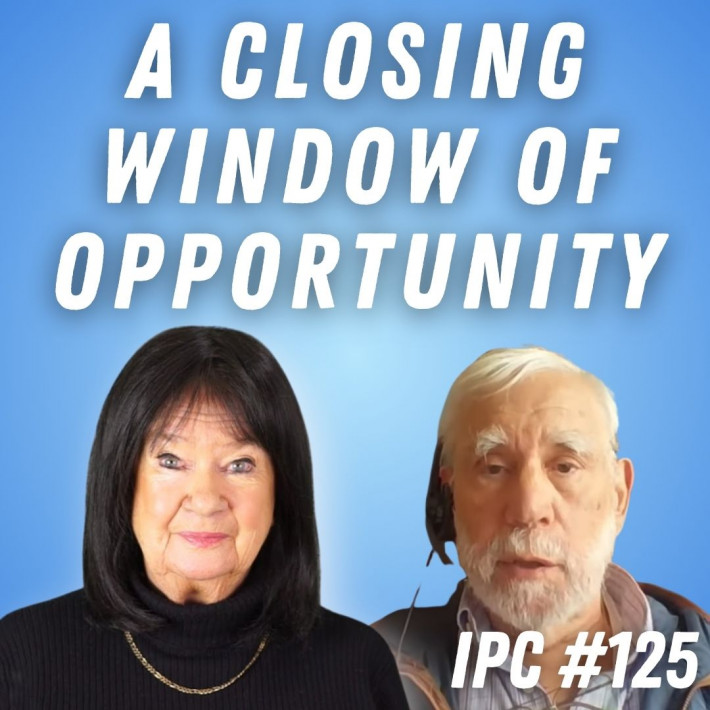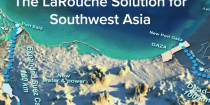Oct. 25, 2025 (EIRNS)—The 125th consecutive weekly meeting of the International Peace Coalition (IPC) on Friday, Oct. 24, was not the usual panel discussion, but instead a dialogue between Schiller Institute founder and IPC initiator Helga Zepp-LaRouche and Theodore Postol (U.S.), professor emeritus of Science, Technology and National Security at the Massachusetts Institute of Technology.
Zepp-LaRouche began by describing the present strategic turmoil, where we are buffeted between hope and chaos. The Wall Street Journal said that the U.S. had given permission to Ukraine to use Tomahawk missiles to strike deep into Russia. U.S. President Donald Trump then denied the story, and Russian President Vladimir Putin warned that a Russian response would be serious, even overwhelming. There was also some confusion about the planned Trump-Putin summit in Budapest, which was on, then off again. Regarding Gaza, Zepp-LaRouche remarked, “The so-called peace deal does not seem to hold.” The Israeli Knesset voted to annex the West Bank, a repudiation of Palestinian statehood and an indication of Israeli obstruction to peace. The window of opportunity to stop World War III may be closing soon, she warned.
On the hopeful side, she reported on the Bering Strait Tunnel Project round-table discussion, which took place on Oct. 22, with experts on engineering, rail development, finance, and diplomacy from the U.S., Russia, Italy, and Germany.
Putin’s Leadership vs. German Lunacy
Zepp-LaRouche described Putin as “one whom one can only admire for his seemingly endless patience.” She charged that the “regime-change” people who want to get rid of “that thoughtful Putin” have not considered who would replace him, who would control Russia’s nuclear arsenal. Her sentiments were echoed by Postol, who said: “Whenever Putin shows restraint that saves humanity from catastrophe, they think it shows weakness on his part … he shows extraordinary ability to finesse these situations…. We can only be grateful that we did not have a Joe Biden equivalent in the Russian leadership.”
On the other hand, Zepp-LaRouche described how German Chancellor Friedrich Merz has shifted to an “idiotic” policy of “strategic uncertainty” regarding the deployment of Taurus missiles to Ukraine. To keep one’s opponent guessing is “really playing with fire,” she said. Postol added that he finds it hard to believe that anyone could have such a lack of grasp of history as to behave as Merz is behaving: “Germany is now being subjected to strategic deception by its political leadership and the American leadership.” Merz is lying when he says that the missiles deployed to Germany will not be nuclear armed. “The Russians will have no choice but to treat these weapons as nuclear armed,” Postol said. If they are conventional, they are meaningless. He compared this to the installations in Poland and Romania of defensive missiles that can quickly be converted to offense; the Russians do not have the luxury of speculating as to what the current status of those missiles may be. Merz’s approach will tremendously increase the likelihood that nuclear war will begin on German soil.
Teetering on the Brink of Nuclear War
Postol reported that there had been catastrophic events in the past few days, and that Trump’s statements and actions have seriously damaged the prospects for diplomatic progress. Putin has wisely offered to adhere to START provisions for a year while negotiations take place on renewing the treaty. However, due to Trump’s actions, “I think that Russia has now been put in a situation … where it really has no choice but to solve its security concerns on the battlefield in Ukraine.”
Postol, a leading expert on the consequences of the use of nuclear weapons, revisited some of the alarming material he has presented in past IPC meetings. “A nuclear war will effectively end modern civilization,” he said. “This is simply a fact of physics…. Fighting and winning a nuclear war is simply not technically feasible.” Statements by Merz, French President Emmanuel Macron and British Prime Minister Keir Starmer betray a deep ignorance of these facts.
Because of the extreme destructive effects of nuclear weapons, any nation that is attacked with them will be forced to respond with nuclear weapons in a desperate effort to save itself. Able Archer was a 1983 NATO military exercise, simulating a war with the Warsaw Pact, conducted with high-level participants, including then-U.S. Secretary of Defense Caspar Weinberger. By day five of the exercise, it had escalated to the hypothetical use of strategic nuclear weapons—and the U.S. and Soviet Union no longer existed.
Regarding the physical effects of the use of nuclear weapons, Postol said that most people imagine the main devastation to be the result of the shockwave, but that is just a secondary effect. Extraordinary damage is done by the initial fireball, which is much worse than the shockwave. The fireball would set fires over a vast area—approximately 600-700 square kilometers would be instantly ignited. Hurricane-force winds would be sucked into this area by upward convection, causing a gigantic firestorm, a fire tornado. Shelters would turn into ovens. Three-hundred-kph winds would accompany the shockwave that follows. Postol illustrated this very dramatically and passionately with historic images.
Europe’s War Dance
Zepp-LaRouche noted that Putin had changed Russia’s strategic doctrine one year ago, from a basic “no first use” doctrine to one under which Russia reserves the right to use nuclear weapons, when even a conventionally armed country backed by a nuclear power threatens the national existence of Russia. The previous doctrine was not sufficient to deter existential threats.
Postol commented on the rearmament drive from leading NATO nations: “As for all this talk about going to war with Russia, it’s almost laughable.” Russia clearly has no intention to invade Europe or occupy Ukraine. They have been forced to take action because of the behavior of the West. In January of 2022, then-U.S. Secretary of State Antony Blinken told Russian Foreign Minister Sergey Lavrov that the U.S. reserved the right to put nuclear weapons in Ukraine. Why is anyone surprised that Russia then invaded Ukraine?
Zepp-LaRouche asked Postol for his take on the strident calls for a conventional arms buildup. Postol said that the collapse of the German economy is a direct result of the Ukraine war. When Biden blew up the Nord Stream pipeline, he did much more damage to Germany than to Russia. “Germany is in the process of deindustrializing,” but Merz is not concerned with that. He wants to divert limited funds away from the people of Germany to prepare for an unnecessary war with Russia. European leaders are so desperate to cover up their own responsibility for the economic collapse that they are willing to initiate a war with Russia.
Good and Evil
When the session was opened to questions, one person asked about the question of evil in strategic politics. Zepp-LaRouche stressed the tenth of her Ten Principles of a New International Security and Development Architecture, that man is basically good. She said that the origin of evil is the system of oligarchy. Friedrich Schiller said the most important requirement for humanity is Empfindungsvermögen (empathy). What good does it do you to have written on your tombstone that you owned 200 Porsches and ate kilotons of caviar? Hannah Arendt was not entirely wrong about the “banality of evil.”
Postol agreed that man is good, with some qualification. He said that man is also “cursed with animal instincts.” We need a world where reason can overwhelm our animal instincts. Unfortunately, he said, there are very few people in positions of power today who wish to do good. European leaders of today created the conditions which led to the Ukraine war. They lack the courage of a Nikita Khrushchev to admit it when they have made mistakes.
Conclusion
Zepp-LaRouche expressed her appreciation of Postol as a “voice of reason,” saying that if you don’t start with what Postol laid out about the reality of nuclear war, you will end up wrong. She encouraged all participants to redouble their efforts to halt the march toward nuclear war, before the window of opportunity closes forever. [eir]











